新路径英语六年级上册句型
外研版六年级上册m1-m10重点短语、句型、语法归纳
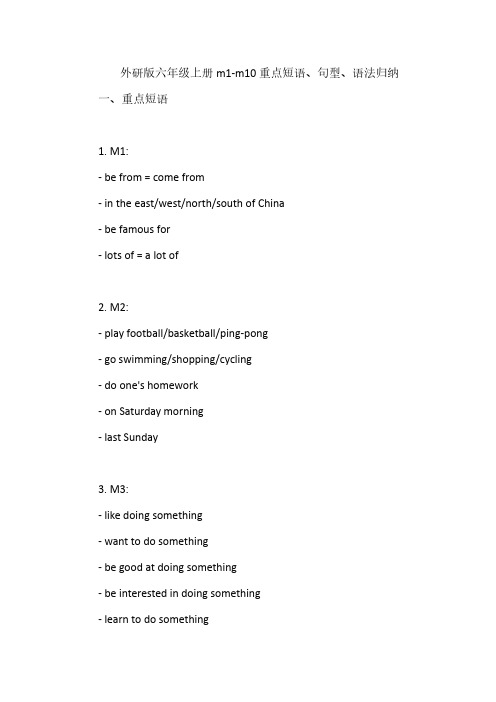
外研版六年级上册m1-m10重点短语、句型、语法归纳一、重点短语1.M1:-be from=come from-in the east/west/north/south of China-be famous for-lots of=a lot of2.M2:-play football/basketball/ping-pong-go swimming/shopping/cycling-do one's homework-on Saturday morning-last Sunday3.M3:-like doing something-want to do something-be good at doing something-be interested in doing something-learn to do something4.M4:-be going to do something-have a party-buy some presents-make some food-do some shopping5.M5:-there is/are-have got-would like to do something-show someone around-live in6.M6:-How long does it take to do something?-It takes someone some time to do something. -How far is it from A to B?-It's about...kilometers away.7.M7:-be different from-in the past-change a lot-keep healthy/fit-be good for8.M8:-be made of-be used for-be made in-be famous for-be known as9.M9:-prefer doing something to doing something -would rather do something than do something -as soon as possible-get ready for-prepare for10.M10:-wish to do something-hope to do something-plan to do something-decide to do something-try to do something二、重点句型1.M1:-Where are you from?-I'm from China.-What are you famous for?-We're famous for our beautiful mountains.2.M2:-What do you usually do on Saturday morning? -I usually play basketball.-What did you do last Sunday?-I went shopping.3.M3:-I like playing basketball.-She wants to learn to dance.-He is good at drawing.-They are interested in learning English.4.M4:-We are going to have a party next week.-I am going to buy some presents for my friends. -They are going to make some food for the party.5.M5:-There is a park near my home.-I have got a new bicycle.-Would you like to come to my party?-Can you show me the way to the museum?6.M6:-How long does it take to walk to school?-It takes me about30minutes to walk to school. -How far is it from your home to school?-It's about2kilometers away.7.M7:-Life in the past was very different from life today.-Things have changed a lot in the last few years. -We should keep healthy and fit.-Eating vegetables is good for our health.8.M8:-Pavilions are usually made of wood.-Chopsticks are used for eating rice.-This car is made in Japan.-China is famous for its tea.9.M9:-I prefer playing basketball to playing football. -I would rather stay at home than go out.-Please send the email as soon as possible.-We are getting ready for the English test.10.M10:-I wish to travel around the world.-She hopes to become a doctor in the future. -They plan to visit their grandparents tomorrow. -He decided to give up smoking.-She tries to finish her homework every day.三、语法归纳1.一般现在时:表示经常发生的动作或现在的状态。
译林版小学六年级上册英语全册各单元短语句型大全总结
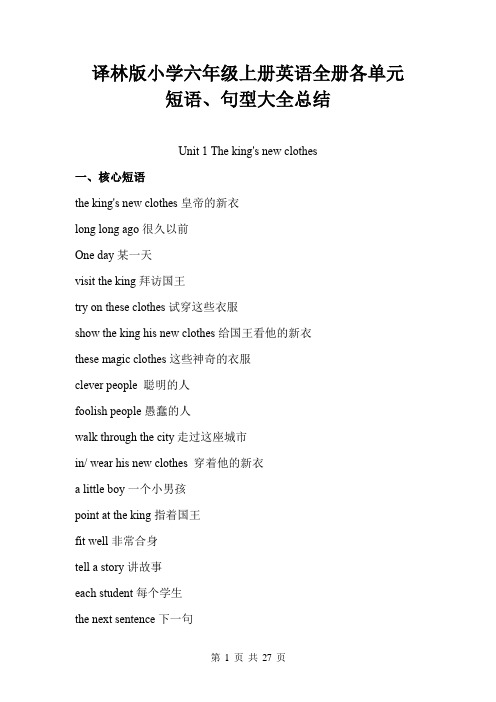
译林版小学六年级上册英语全册各单元短语、句型大全总结Unit 1 The king's new clothes一、核心短语the king's new clothes皇帝的新衣long long ago很久以前One day某一天visit the king拜访国王try on these clothes试穿这些衣服show the king his new clothes给国王看他的新衣these magic clothes这些神奇的衣服clever people 聪明的人foolish people愚蠢的人walk through the city走过这座城市in/ wear his new clothes 穿着他的新衣a little boy一个小男孩point at the king指着国王fit well非常合身tell a story讲故事each student每个学生the next sentence下一句think hard努力地想have to不得不in front of the house在房子前面;walk by the house步行经过房子shout at the old man对着老人大喊give me your child 把你的孩子给我be nice to her对她很好look after him照顾他turn into a prince变成王子二、重点句型1. My king, we can make new clothes for you.我的国王,我们可以给您做新衣服。
【解析】can为情态动词,后面跟动词原形;“make sth.for sb."意为“为某人制作某物",for为介词,后面如果跟人称代词需要用其宾格形式。
My mother can make dresses for me.我妈妈可以给我做连衣裙。
They are making a birthday cake for Su Hai.他们正在为苏海制作一个生日蛋糕。
六年级上册各单元核心句型归纳

六年级上册各单元句子集(一)要求:每天读一读一、核心句型【Unit1】①问“某地在哪里”:Where is the + 地点?回答:It’s + 表示地点的介词短语Where is the museum shop ? 博物馆商店在哪里?It’s near the door .它在门旁边。
②问路:How can we / I get to + 地点?指路:Turn left / right / go straight + at + 地点How can we get to the cinema ? 我们怎样到达电影院?How can I get there ? 我怎样到那里?Turn left at the crossing, then go straight . 在十字路口左转,然后直走。
【Unit2】①问上学的交通方式:How do you come to / go to school ?回答:I come / go + 交通方式(表达交通方式:by + 交通工具)②交通规则(traffic rules):We must pay attention to the traffic light s. 我们必须注意交通信号灯。
Slow down and stop at a yellow light . 黄灯时要减速慢行并停下来。
Stop and wait at a red light . 红灯停并等待。
Go at a green light .绿灯行。
Don’t go at a red light . 不要闯红灯。
【Unit3】▲be going to 句型表示“准备,打算干什么”,常和表示将来的时间连用。
①What are you going to do this weekend ? 这个周末你准备干什么?I am going to go on a picnic . 我要去野餐。
We are going to draw some pictures in Renmin Park . 我们要在人民公园画画。
六年级上册英语第二单元重点句型
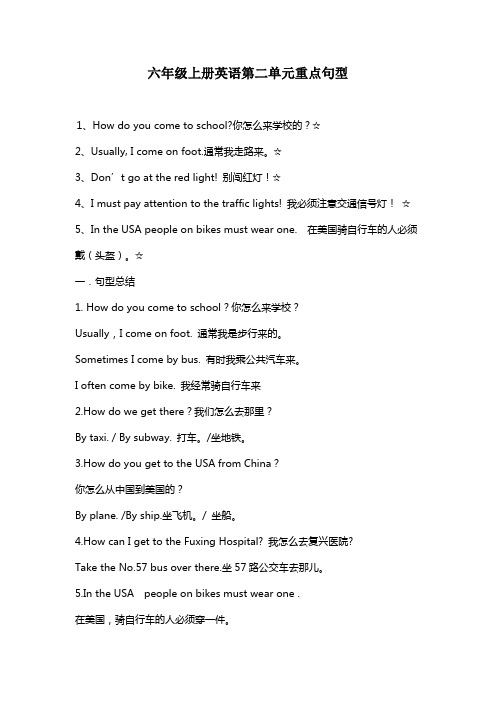
六年级上册英语第二单元重点句型1、How do you come to school?你怎么来学校的?☆2、Usually, I come on foot.通常我走路来。
☆3、Don’t go at the red light! 别闯红灯!☆4、I must pay attention to the traffic lights! 我必须注意交通信号灯!☆5、In the USA people on bikes must wear one. 在美国骑自行车的人必须戴(头盔)。
☆一.句型总结1. How do you come to school?你怎么来学校?Usually,I come on foot. 通常我是步行来的。
Sometimes I come by bus. 有时我乘公共汽车来。
I often come by bike. 我经常骑自行车来2.How do we get there?我们怎么去那里?By taxi. / By subway. 打车。
/坐地铁。
3.How do you get to the USA from China?你怎么从中国到美国的?By plane. /By ship.坐飞机。
/ 坐船。
4.How can I get to the Fuxing Hospital? 我怎么去复兴医院?Take the No.57 bus over there.坐57路公交车去那儿。
5.In the USA people on bikes must wear one .在美国,骑自行车的人必须穿一件。
6.I must pay attention to the traffic lights!我必须注意交通灯7.Slow down and stop at a yellow light.减速,在黄灯处停下来。
Stop and wait at a red light.红灯要停下来等一会。
人教版PEP小学英语六年级上册重点句型及语法知识汇总

人教版PEP小学英语六年级上册重点句型及语法知识汇总Unit 1 How can I get there?重点单词XXX。
post office邮局,XXX。
XXX。
XXX。
crossing十字路口。
turn left左转。
turn right右转。
gostraight直走。
map地图。
compass指南针。
GPS全球定位系统。
stars星星。
XXX意大利餐厅。
getto到达。
重点句型1.---Where is the restaurant?餐厅在哪里?It’s next to the park on Dong fang Street.它在东方路,在公园附近。
2.---How can we get there?我们怎么去哪里?XXX left XXX.书店左转,然后病院右转。
3.He now has GPS.他现在有GPS。
4.What an interesting film!何等风趣的片子!方位词复:XXX紧挨着,near在。
邻近,XXX在。
背面,XXX在。
旁边,in front of在。
前面。
Unit 2 Ways to go to school重点单词on foot走路。
by bike骑车。
by bus乘公交。
by train乘火车。
XXX乘地铁。
by ship搭船。
by XXX乘飞机。
slow down 慢下来。
XXX交通灯。
traffic rules交通划定规矩。
go/come to school上学。
by sled坐雪橇。
byferry坐轮渡。
pay n to留意。
traffic lights交通灯。
and wait at a red light红灯停等一等。
slow downand。
at a yellow light黄灯减速并停下。
Go XXX。
重点句型1.---How do you come to school?你怎么上学?----Usually。
I come on foot.通常我走路来的。
人教版六年级英语上册全册重点句型复习
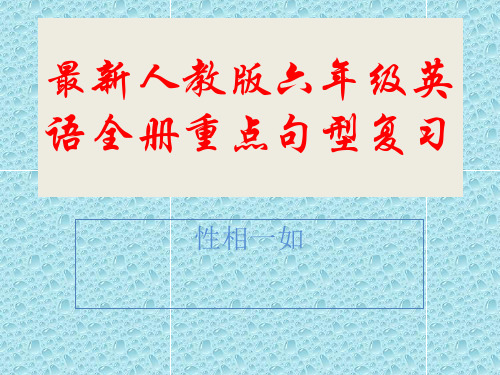
性相一如
1、Where Is the hospital? It’s in front of the cinema.
问路句型
Where is +地点? It’s +表示位置的短语。
2、How can we get there? Turn left at the bookstore.
• Hobbies, are, what, your(?) • What are your hobbies? • Like,she,dancing,does(?) • Does she like dancing? • Live, I, in, Changsha(.) • I live in Changsha. • I,like, reading, stories,also(.) • I also like reading stories.
2、以不发音的字母e结尾,去e加ing • 如make---making,write---writing • 末尾只有一个辅音字母的重读闭音节,双写末
尾辅音字母,再加ing,如stop—stopping, begin--beginning
Does he live in Sydney? No,he doesn’t.
做什么的?
Where does he work? He works at sea .
询问他人的工作地点 Where does +主语(第三人称单数)+work? He/She works +表示地点的介词短语 询问他人上班方式句型及答语 How does +主语(第三人称单数 )+go to work? He/She goes to work +出行方式(by bike , on foot , by bus …)
六年级上册英语常用句式
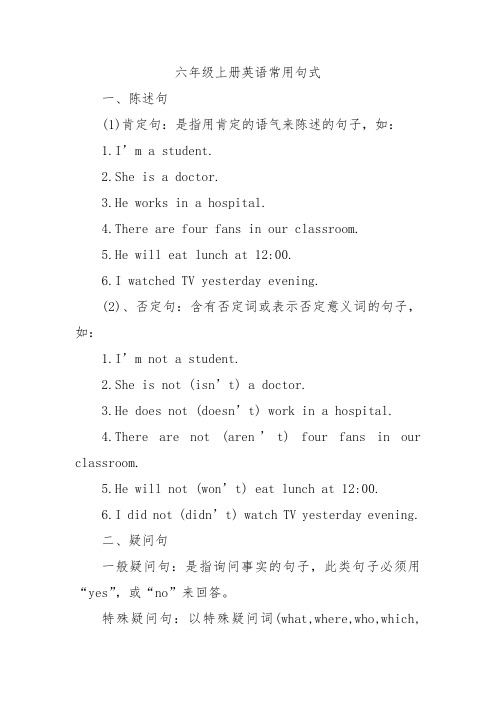
六年级上册英语常用句式一、陈述句(1)肯定句:是指用肯定的语气来陈述的句子,如:1.I’m a student.2.She is a doctor.3.He works in a hospital.4.There are four fans in our classroom.5.He will eat lunch at 12:00.6.I watched TV yesterday evening.(2)、否定句:含有否定词或表示否定意义词的句子,如:1.I’m not a student.2.She is not (isn’t) a doctor.3.He does not (doesn’t) work in a hospital.4.There are not (aren’t) four fans in our classroom.5.He will not (won’t) eat lunch at 12:00.6.I did not (didn’t) watch TV yesterday evening.二、疑问句一般疑问句:是指询问事实的句子,此类句子必须用“yes”,或“no”来回答。
特殊疑问句:以特殊疑问词(what,where,who,which,when,whose,why,how等)开头引导的句子。
此类句子应该问什么就答什么,不能用“yes 、no”来回答。
三、There be句型There be 句型与have, has的区别There be 句型表示:在某地有某物(或人)在there be 句型中,主语是单数,be 动词用is ; 主语是复数,be 动词用are ; 如有几件物品,be 动词根据最接近be动词的那个名词决定。
1.there be 句型的否定句在be 动词后加not , 一般疑问句把be 动词调到句首。
2.there be句型与have(has) 的区别:there be 表示在某地有某物(或人);have(has) 表示某人拥有某物。
六年级上册英语所有固定句型
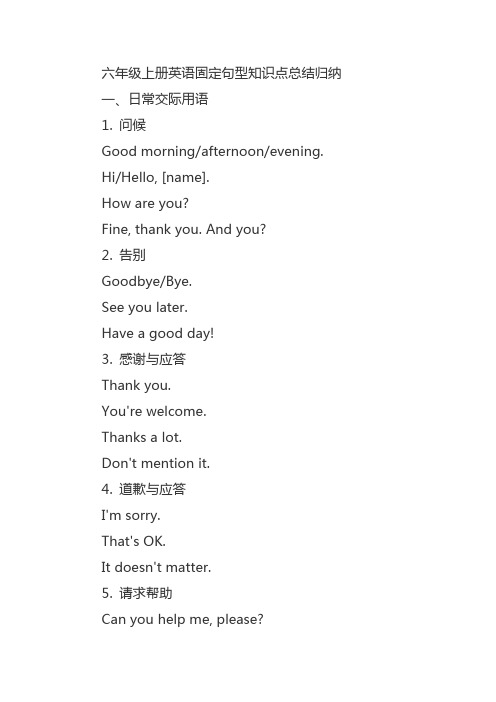
六年级上册英语固定句型知识点总结归纳一、日常交际用语1. 问候Good morning/afternoon/evening. Hi/Hello, [name].How are you?Fine, thank you. And you?2. 告别Goodbye/Bye.See you later.Have a good day!3. 感谢与应答Thank you.You're welcome.Thanks a lot.Don't mention it.4. 道歉与应答I'm sorry.That's OK.It doesn't matter.5. 请求帮助Can you help me, please?Sure, what do you need?6. 表达意愿I'd like to...I want to...二、基本句型结构1. 陈述句肯定句:I like apples.否定句:I don't like apples.2. 一般疑问句Do you like apples?Yes, I do. / No, I don't.3. 特殊疑问句What do you like?I like apples.4. 祈使句Please close the door.Don't forget your homework.5. There be句型There is a book on the table. There are two apples in the basket.三、重点固定句型1. 询问姓名What's your name?My name is [name].2. 询问年龄How old are you?I'm [age] years old.3. 询问职业What do you do?I'm a [occupation].4. 询问爱好What are your hobbies?I like [hobby].5. 询问地点Where is [place]?It's near [another place].6. 询问时间What time is it?It's [time].7. 询问数量How many [nouns] are there? There are [number] [nouns].8. 询问价格How much is it?It's [price].9. 询问颜色What color is it?It's [color].10. 询问食物和饮料What would you like to eat/drink? I'd like [food/drink].11. 询问做某事的能力Can you [verb]?Yes, I can. / No, I can't.12. 询问周末活动What do you do on the weekend?I usually [activity].13. 谈论日常活动What do you do in the morning?I usually [activity].14. 谈论喜欢的科目What's your favorite subject?My favorite subject is [subject]. 15. 谈论天气What's the weather like today?It's [weather condition].16. 提出建议Let's [verb].That sounds good.17. 谈论过去的事件Did you [verb] last weekend?Yes, I did. / No, I didn't.18. 谈论未来的计划Are you going to [verb] this weekend? Yes, I am. / No, I'm not.四、例句1. 询问姓名与回答—What's your name?—My name is Alice.2. 询问年龄与回答—How old are you?—I'm ten years old.3. 询问职业与回答—What do you do?—I'm a teacher.4. 询问爱好与回答—What are your hobbies?—I like reading books.5. 询问地点与回答—Where is the park?—It's near my house.6. 询问时间与回答—What time is it?—It's 8:30.77. 询问数量与回答—How many apples do you have?—I have five apples.8. 询问价格与回答—How much is this book?—It's twenty dollars.9. 询问颜色与回答—What color is your car?—It's blue.10. 询问食物与饮料喜好与回答—What would you like to eat?—I'd like a hamburger and fries.11. 询问做某事的能力与回答—Can you play the piano?—Yes, I can. I've been learning for years.12. 询问周末活动与回答—What do you do on the weekend?—I usually go hiking with my family.13. 谈论日常活动与回答—What do you do in the morning?—I usually brush my teeth, eat breakfast, and then go to school.14. 谈论喜欢的科目与回答—What's your favorite subject?—My favorite subject is science. I love experiments!15. 谈论天气与回答—What's the weather like today?—It's sunny and warm. Perfect for a picnic!16. 提出建议与回应—Let's go to the movies this weekend.—That sounds like a great idea! I'll bring the popcorn.17. 谈论过去的事件与回答—Did you visit your grandparents last weekend?—Yes, we did. We had a great time!18. 谈论未来的计划与回答—Are you going to learn a new language this year?—Yes, I am. I'm thinking about learning Spanish.五、其他常用句型1. 表达感谢Thank you for [something].You're welcome.2. 道歉与回应I'm sorry for [apologizing for something].It's OKAY. / Don't worry about it.3. 表达喜好I like [noun/activity].Me too! / I like it too.4. 表达不喜欢I don't like [noun/activity].Oh, really? What do you like instead?5. 表达惊讶Wow! That's amazing!Thanks. I'm glad you think so.6. 表达同意与不同意I agree with you.I disagree. I think [your opinion] is wrong.六、总结以上是关于六年级上册英语的主要固定句型知识点总结归纳,涵盖了询问信息、表达个人喜好、谈论日常生活、提出建议、谈论未来计划等多个方面。
六年级上册英语句型
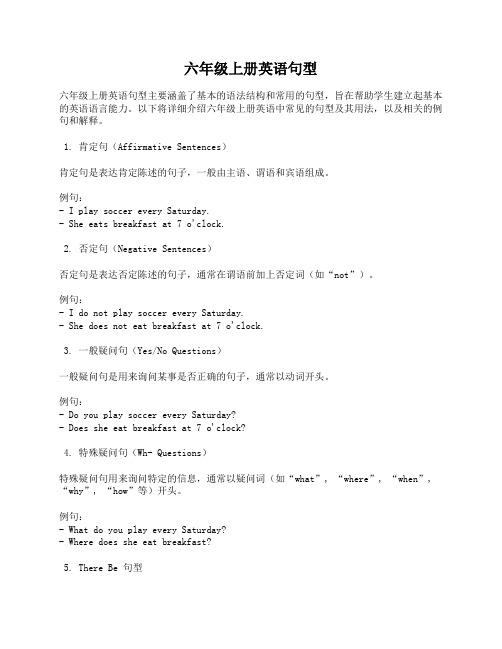
六年级上册英语句型六年级上册英语句型主要涵盖了基本的语法结构和常用的句型,旨在帮助学生建立起基本的英语语言能力。
以下将详细介绍六年级上册英语中常见的句型及其用法,以及相关的例句和解释。
1. 肯定句(Affirmative Sentences)肯定句是表达肯定陈述的句子,一般由主语、谓语和宾语组成。
例句:- I play soccer every Saturday.- She eats breakfast at 7 o'clock.2. 否定句(Negative Sentences)否定句是表达否定陈述的句子,通常在谓语前加上否定词(如“not”)。
例句:- I do not play soccer every Saturday.- She does not eat breakfast at 7 o'clock.3. 一般疑问句(Yes/No Questions)一般疑问句是用来询问某事是否正确的句子,通常以动词开头。
例句:- Do you play soccer every Saturday?- Does she eat breakfast at 7 o'clock?4. 特殊疑问句(Wh- Questions)特殊疑问句用来询问特定的信息,通常以疑问词(如“what”, “where”, “when”, “why”, “how”等)开头。
例句:- What do you play every Saturday?- Where does she eat breakfast?5. There Be 句型There Be 句型用于描述某地方存在某物或某种情况。
例句:- There is a cat on the table.- There are five apples in the basket.6. 情态动词句型(Modal Verbs)情态动词用于表示可能性、许可、能力等。
六年级上册英语重点句型语法总结
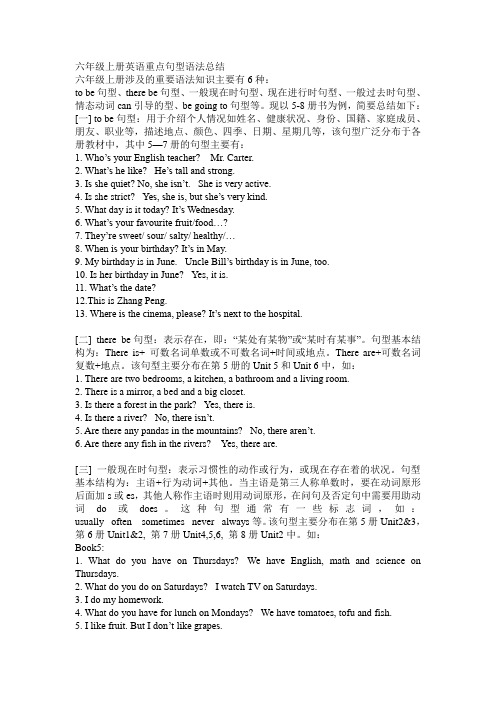
六年级上册英语重点句型语法总结六年级上册涉及的重要语法知识主要有6种:to be句型、there be句型、一般现在时句型、现在进行时句型、一般过去时句型、情态动词can引导的型、be going to句型等。
现以5-8册书为例,简要总结如下:[一] to be句型:用于介绍个人情况如姓名、健康状况、身份、国籍、家庭成员、朋友、职业等,描述地点、颜色、四季、日期、星期几等,该句型广泛分布于各册教材中,其中5—7册的句型主要有:1. Who’s your English teacher?Mr. Carter.2. What’s he like?He’s tall and strong.3. Is she quiet? No, she isn’t.She is very active.4. Is she strict? Yes, she is, but she’s very kind.5. What day is it today? It’s Wednesday.6. What’s your favourite fruit/food…?7. They’re sweet/ sour/ salty/ healthy/…8. When is your birthday? It’s in May.9. My birthday is in June. Uncle Bill’s birthday is in June, too.10. Is her birthday in June? Yes, it is.11. What’s the date?12.This is Zhang Peng.13. Where is the cinema, please? It’s next to the hospital.[二] there be句型:表示存在,即:“某处有某物”或“某时有某事”。
句型基本结构为:There is+ 可数名词单数或不可数名词+时间或地点。
新版PEP六年级英语上册重点句型

熟读下列问答句1.Where is the post office? It’s next to the museum.2.Where is your home? It’s near the bookstore.3.Is there a cinema near your home? Yes, there is. / No, there isn’t.4.Are there any books in the bookstore? Yes, there are./ No, there aren’t.5.Is your home far from your school? Yes, it is. / No, it isn,t.6.How can I get to your home from your school?You can take the No.1 bus. (Turn left at the bookstore. Then turn right at the hospital.)7.How do you go to school? I go to school on foot.8. How do you come to school? I come to school by bike.9. How does your mother go to work? She goes to work by bus.10. How does your father go to work? He goes to work by car.11. Do you usually come to school on foot? Yes, I do./ No, I don’t.12. Does your mother go to work by bike?Yes, she does. / No, she doesn’t.13. When you see the red light, what should you do?I must stop and wait.14. When you see the yellow light, what should you do?I must slow down and stop.15. When you see the green light, what should you do?I must go.16. Where are you going next week? I am going to the park.17. What are you going to do there? I am going to read a book.18. How are you going there? I am going there by bus.19. When are you going? I am going on Saturday morning.20. Who are you going with? I am going with my parents.21. Are you going to the library tomorrow?Yes, I am. / No, I am not. ( No, I’m not.)22. Is your mother going to take a trip next weekend?Yes, she is. / No, she isn’t.23.Is your father going to Shanghai next winter holiday?Yes, he is. / No, he isn’t.24.Are your friends going to the cinema with you?Yes, they are. / No, they aren’t.25.What is your hobby? / What are your hobbies?I like singing.My hobby is singing. / Singing is my hobby.My hobbies are singing and dancing.Singing and dancing are my hobbies.26.What is your mother’s hobby? / What are your mother’s hobbies?She likes listening to music.Her hobby is listening to music.Her hobbies are listening to music and watching TV.27.What is your father’s hobby? / What are your father’s hobbies?He likes reading books.His hobby is reading books.His hobbies are reading books and playing football.28.What is his hobby? / What are his hobbies?He likes playing football.His hobby is playing football.His hobbies are playing football and doing kung fu.29.What is her hobby? / What are her hobbies?She likes reading stories.Her hobby is reading stories.Her hobbies are reading stories and singing.30.Do you live in Nanhai? Yes, I do. / No, I don’t.31.Does your uncle live in Beijing? Yes, he does. / No, he doesn’t.32.Do your parents go to work on foot? Yes, they do. / No, they don’t.33.Does your teacher like going hiking? Yes, he does. / No, he doesn’t.34.Do you like doing word puzzles? Yes, I do. / No, I don’t.35.Can you cook Chinese food? Yes, I can. / No, I can’t.36.The birds can fly. Can you fly? No, I can’t. (No, I can not.)37.What does your father do? He is a businessman.38.Where does your father work? He works in a factory.39.How does he go to work? He goes to work by car.40.What does your mother do? She is a worker.41.What do you do? I am a student.42.What do you want to be in the future?(将来)I want to be a teacher.43. What are you going to be in the future?I am going to be a postman.44. I s your father a police officer? Yes, he is. / No, he isn’t.45. Is your mother a housewife? Yes, she is. / No, she isn’t.46. How do you feel? I feel happy. / I am happy.47. How does your mother feel? She feels sad. / She is sad.48. If you are ill. What should you do?I should see a doctor.49. If your mother feels cold today. What should she do?She should wear warm clothes.。
六年级上册英语句子句型

【导语】从⼩学开始学习英语,就应该多读多多背,增强⾃⼰对英语的吸收,今天是由®⽆忧考⽹在这⾥为⼤家分享六年级上册英语句⼦句型,欢迎⼤家阅读!【篇⼀】六年级上册英语句⼦句型 Unit 1 How do you go there? 1. --- How do you go to school? 你怎么去上学? --- Usually I go to school on foot. 通常我步⾏去上学。
--- Sometimes I go to school by bike. 有时我骑⾃⾏车去上学。
2. ---How can I get to the zoo? 我怎么到达动物园? ---You can go by subway. 你可以乘地铁去。
3.--How can I get to Zhongshan Park? --- You can go by the No.15 bus. 4. Look at the traffic lights. 5. Remember the traffic rules. 6. Stop at a red light. 7. Wait at a yellow light. 6.Go at a green light. 7.--Where is your home? ---My home is near the post office. Unit 2 Where is the science museum? 1.. ---Excuse me. Where is the library? --- It’s in front of the school. 2.---Excuse me, is there a cinema near here? ---Yes ,there is ./No, there isn’t. 3.--Where is the cinema? . ---It’s next to the hospital. 4.---Is it far from here? ---No, it’s not far. 5. I want to buy a pair of shoes. 6.---How can I get to the bank? ---You can go by No.15 bus. 7.Get off at the post office. 8. --- Go/Walk straight for three minutes.【篇⼆】六年级上册英语句⼦句型 1.Easy come,easy go.来的容易,去得快 2.Time and tide wait for no man.时间不等⼈ 3.Every dog has his day.⼈⼈都有得意时4.If winter comes,can spring be far behind.冬天来了,春天还会远么5. Try not to become a man of success but rather try to become a man of value. -- A. Einstein 不要为成功⽽努⼒,要为做⼀个有价值的⼈⽽努⼒。
新路径英语新版六年级上册 What a mess

Clean the bedroom, please. All right, ok.
Living room
study
Kitchen
bathroom
Can I help you?
Yes, please water the flowers.
turn on the TV
turn off the computer
Homework
1. 背诵 let’s talk。并抄写一 遍课文带意思。 2. 回家后帮助家人做些 家 务。 3. 完成 make a survey(做调 查)。
Look ,listen and say
•ng ring song •nk ink think
sing thank
• 1. cinderella 意为灰姑娘 • 2. Let’s go to the ball 。指让 我们一起去参加舞会吧,ball 的意思在这里不是指球,而 是指舞会。 • 3.How I wish 是感叹句,我多 么希望能够去参加舞会啊。
Learn to write
• 记住,月份是特殊名词,无论它处 于哪个位置,都要大写. • 1. march 改为March • 2. september 改为September • october 改为 October • 3. february 改为 February.
make tea 沏茶
cook the meals
set the table
do the dishes
wash the cups
•. • turn on the TV • turn off the computer • make tea cook the meals • set the table do the dishes • wash the cups
六年级上册英语第二单元句型

六年级上册英语第二单元句型English:In the second unit of the sixth grade English textbook, we learned several sentence patterns. One sentence pattern is the simple present tense, for example: "I play basketball every Friday." Another sentence pattern is the simple past tense, for example: "She visited the zoo last weekend." We also learned how to make questions using the verb "to be", for example: "Is she your friend?" Additionally, we practiced using adverbs to modify verbs, such as: "She sings beautifully." We also learned how to use the modal verb "can" to express ability, for example: "I can swim."中文翻译:在六年级英语教科书的第二单元中,我们学习了几种句型。
一个句型是简单现在时,例如:“我每个星期五打篮球。
” 另一个句型是简单过去时,例如:“她上个周末去动物园了。
” 我们还学会了如何用“to be”动词来构成疑问句,例如:“她是你的朋友吗?” 另外,我们练习了使用副词来修饰动词,比如:“她唱歌唱得很好听。
- 1、下载文档前请自行甄别文档内容的完整性,平台不提供额外的编辑、内容补充、找答案等附加服务。
- 2、"仅部分预览"的文档,不可在线预览部分如存在完整性等问题,可反馈申请退款(可完整预览的文档不适用该条件!)。
- 3、如文档侵犯您的权益,请联系客服反馈,我们会尽快为您处理(人工客服工作时间:9:00-18:30)。
六年级上册句型
1、What are you doing? I’m planting trees./we are playing
badminton. /We are waiting for Sam Smith.
2、What is she/he doing? She/He is listening to the
teacher……
3、What class are you in? I’m in Class5,Grade6.What
about you?
4、 Where is the music room? It’s on the
first/second/third floor.
5、 Nice to see you again.
6、 Let me show you around.
7、What are they doing? They are lighting the candles/writing
a card…….
8、When is Teacher’s Day? It’s on September 10th.
9、What do you usually do on this day? We usually send cards
or flowers to our teachers.
10、What flowers do you usually send? We usually send
carnations.
11、What would you like to drink/eat? I’d like some
juice.
12、Where is classroom? It’s beside /opposite the
teacher’s office.
13、Do come in.
14、What a nice room.
15、I’m tird.May I have a rest? Yes ,of course.
16、May I play computer games/open the window?
Yes,please./Yes,you can
17、Clean the bedroom/Make the bed,please. All right/Ok.
18、Can I help you? Yes,please water the flowers/cook
the meal…….
19、Take it easy. We can help you.
20、Sweep the floor,please. No problem.
21、What a mess.
22、This is a tomato. This is not a pumpkin.
23、These are tomatoes These are not tomatoes.
24、That is a witch. That is not a ghost.
25、Those are witches. Those are not ghosts.
26、Is this/that /it a pumpkin? Yes,it is./No,it isn’t.
27、What's this in English? A pumpkin.
28、They're made of pumpkins.
29、They look so nice.
30、They 're called jack-o’-lanterns.
31、I think so.
32、It always follows the witch.
33、These are bats and those are ghosts.
34、I hate bats and I’m afraid of ghosts. Me,too.
35、This is a cock. The cock is small.
36、That is a turkey. The turkey is big.
37、These are moon cakes. The moon cakes are round.
38、Those are bananas. The bananas are long.
39、Here's an e-mail about Thanksgiving Day.
40、We celebrate the harvest.
41、Please tell me something about your mid-autumn Festival.
42、Thank you for your e-mail.
43、I like turkey/potato/sweet potato……
44、Who’s this? It’ Father Christmas.
45、Who are they? They are ghosts.
46、What’s this? It’s a Christmas tree.
47、What are these/those? They are fireworks.
48、What a pretty Christmas tree.
49、Here’s a Christmas card for you.
50、How nice they look.
51、Tell me something about Christmas.
52、Do you think it’s true? I think our parents give us the presents.
53、Santa Claus comes down the chimney and puts presents in our stockings.
54、It's so interesting.
55、This is the bedroom. We sleep here.
56、This is the living room. We watch TV here.
57、This is the dining room. We eat here.
58、This is the bathroom. We take a bath here.
59、This is the study. We read books here.
60、This is the kitchen. We all cook here.。
